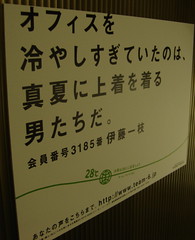If you care about this stuff, go to the White House (boring and patriotic), State Dept. (elegant and easy to navigate), and Defense Dept. (slick and expensive-looking) websites. It’s all there in English.
ブッシュ大統領
5月31日の記者会見にて
Q:イラク戦争の前にあなたは「イラク戦争は他の国のWMD開発の抑止となる」と言っていたが、実際はイランや北朝鮮では何の抑止にもなっていないじゃないか。
A:北朝鮮は2000年以前にも隠れた兵器プログラムを持っていた。我々は北朝鮮と2カ国協約を結んでいたが、北朝鮮はそれを破った。それで、私は政策を変えて、北朝鮮が核開発プログラムを廃止するように他の国の参加を呼びかけた。
中国が「責任のある国家であれば、兵器プログラムを廃止しろ」と我々と同じことを言っていることが重要だ。 日本、韓国、ロシアも同じことを言っていることも重要だ。
北朝鮮の件で問題が山積みであるがやめるわけではないし、責任のある国家として扱って欲しいなら、参加している5カ国を聞かなければならないとはっきり分からせることに努力を続けるつもりだ。
Q: 今朝あなたは北朝鮮を扱うのに外交がベストな手法だと言っていたが、失礼だけど、「外交は何の成果を果たしておらず、むしろ北朝鮮核開発を進歩させたじゃないか」と言う人がいる。
A: はい。
Q How do you — what do you say to them? そういう人にたいしてどう言い返すか。
A: さて、考えよう。もし外交が間違った方法であれば、次は軍事だ。それは私の考え方、外交か軍事かだ。私は外交に賛成である。だから、あらゆる提案は検討中だが、外交で解決する機会がある。
チェイニー
先週:チェニー「金正日は無責任」とののしったことに対して、北朝鮮の報道はCHENEYのことを「血に飢えた獣性」と言い返した。
ライス国務大臣
5月26日・BLOOMBERGとのインタビューにて
Q:アメリカと中国にとって今年でもっとも重要な成果とは何か。
A: 色々な面で米中関係が強くなったので、全体的に米中関係は強くなっている。江沢民の完全なる引退をゆえに実力を固めた胡錦涛大統領はとてもいい関係を確立している。北朝鮮の核問題で協力と調整を維持している。未だに解決されていないが、アメリカと中国が、特に北朝鮮と近隣国家である中国が受ける大変なプレッシャーを受けているにもかかわらず、外交を通じて「非核の朝鮮半島」に関して継続的に取り組んでいることはかなりの成果だと思う。
対テロの面でも協力を強くなっており、ほぼなんでも正直に、そして露骨に話せるような関係を作った。
Q:中国が6カ国協議において役立っていると言っているが、中国は米国が(北朝鮮と)もっと実質的な2カ国協議を行って欲しいと言明している。なぜアメリカは2カ国協議をしないか。
A: それは、既にその道で1994年に協約を結んだが、違う手段で核開発を図ってそれをすぐ破ったからだ。
アメリカは北朝鮮と2カ国協議を行うと、NKがケチを言って米朝間の問題にすることができる。しかし、米朝間の問題ではない。地域はどんな形になるのかや、核を持った北朝鮮は朝鮮半島に存在するのかという問題で、それは日本、韓国、中国、ロシア、それからアメリカの安保にとってどんな意味を持つかという問題だ。
6カ国協議の本当の成果は何かというと、いまだに北朝鮮問題を解決していないが、核を持った北朝鮮はアメリカの問題だけじゃなく、北朝鮮の近隣国全部にとって問題であることをハッキリさせたことだと思う。その枠組みを維持しなければならない。我々は(北朝鮮と)はなしている。コミュニケーション目的(交渉目的じゃない)でニューヨークを通じて(北朝鮮と)はなしている。6カ国協議の形でも話している。北朝鮮と話すことが怖いわけではない。ただ、その会話がどんな形を取るかという問題だから、その形が米朝の二カ国関係についてであれば、話すことはあまりない。
Q:この5年で核技術を拡大してきたのにかかわらず、それに対する罰は極めて軽かった。そのまま続けないと思わせる理由はあるか。
A: 罰は軽かったとは思わない。機会費用ならいっぱい費やしているに違いない。1999,2000,2001年には、ロシアと拡張的な関係について協議があった。ルーチンは北朝鮮を訪れた。日本と外交正常化についても協議があった。南北対話も大きく進歩していた。我々も2002年に北朝鮮に対して「大胆なアプローチ」という政策を準備していた。それはリビアに対するアプローチとよく似ており、アメリカや地域全体にももっと改善した関係への道でもっと正常的な関係につながるはずだった。
ラムスフェルド防衛大臣
6月4日・International Institute for Strategic Studiesにて
Shangri-La Hotel, Singapore, Saturday, June 4, 2005.
世界で最も自由と圧制の違いがはっきりと現れているところは朝鮮半島と言えよう。
私は「夜で見る朝鮮半島」の衛星写真を机の上に飾っている。DMZの下、南の半分にはほとんど光に覆われている。それは電力、活発している経済、それから生き生きしている民主主義のある国家を意味している。そして、DMZの北をご覧になれば、ピョンヤンのわずかな光を除いて暗闇しか見えない。北でも南でも同じ国民で、同じ資源を持っている。その違いは自由だ。政治的自由と経済的自由。
現場に行けばその対象がさらにハッキリして、意味深いである。大韓民国は自由な国民と自由な市場における活力(DYNAMISM)の一例である。
比較すると、北朝鮮におけるスターリン主義政権を考えてみてください。あそこでは:
反体制の人の子供や孫が強制労働をさせられる
逃れた難民が外国から拉致される、それから
飢餓に遭っている国民が一粒のご飯を見つけるために荒地を探す。
北朝鮮で数ヶ月子供の医療をしていた欧州の医者はこう言った。「北朝鮮では二つの世界がある。ひとつは軍事高官・高層の人たちの世界と、もう1つはそれ以外の人たちのための生き地獄。
北朝鮮の「核の野望」は地域の安保・安定の脅威となり、拡散の前科からみれば世界の脅威ともなる。ブッシュ大統領や後の4カ国の首脳は6カ国協議に戻るよう促している。
それから、アメリカは近隣国の成長を支援してきた開放性と自由を抱くよう促している。
北朝鮮が6カ国協議に戻るのに大きな役割を果たせる国家といえば、その国は中国である。
アメリカや多くの国々は外交、経済、世界の安保など多くの場面で中国と協力したい。多くの国々は平和的で豊かで自由な地域という目標を促進させるようなアジア太平洋構造作りに賛成的である。他国間の取り組みは重要である。中国はその協力に大きな役割を果たせる。



 (More Cool Biz goodness at
(More Cool Biz goodness at 



